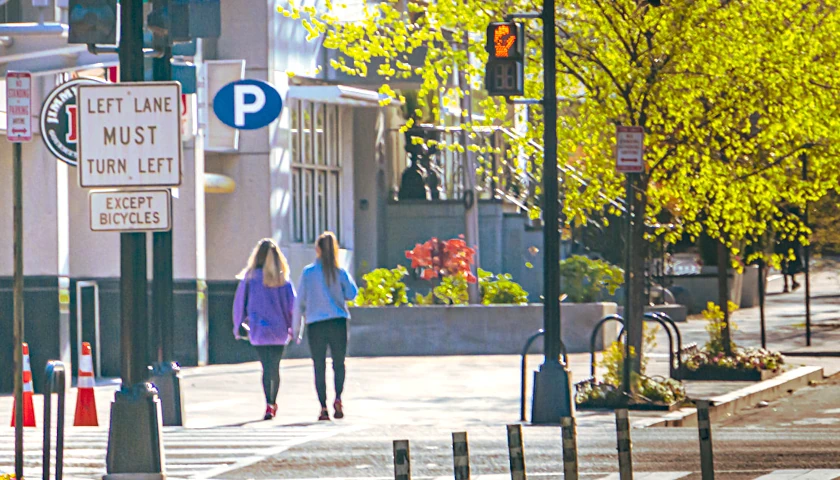A survey first reported Monday by the Wall Street Journal found that 30 percent of young people say their faith grew stronger during the COVID pandemic, and that the percentage of those who say they know a “higher power” exists surged to 28 percent in December 2022 from the 22 percent reported in the 2021 survey.
Conducted by nonprofit Springtide Research Institute, the survey cites the context of the COVID pandemic lockdowns, when young people were largely isolated from others, and the subsequent mental health crisis among them had already begun to reach “epidemic proportions.”
The poll found that while young people engage in spirituality and religion, they do not necessarily participate in traditional or conventional practices.
According to Springtide, which states it maintains “the largest dataset on young people and spirituality in America”:
More young people told Springtide that their faith became stronger during the pandemic (30%) than weaker (18%) or lost completely (8%). This includes a growing number who agree, “I know a higher power exists and I have no doubts about it,” from 22% in 2021 to 28% in 2022, and a higher percentage who say they feel “highly connected” to a higher power, from 13% in 2021 to 18% in 2022. Conversely, the percentage of those who say they “don’t feel connected at all” to a higher power dropped from 36% in 2021 to 27% in 2022.
The survey also found that 53 percent of young people said their mental health has been one of the “biggest challenges during the pandemic.”
For religious young people, 67 percent say their religious/spiritual life is important for their mental health, and 73 percent agree, “My religious/spiritual practices positively impact my mental health,” Springtide asserts, adding:
Young people who tell us they are “very religious” are more likely to tell us they are flourishing in their mental health. The inversion is true for those who say they are “not religious at all”—they are more likely to say they are not flourishing in their mental health.
The Springtide survey comes as other polling suggests a decline in faith in God and religious belief among young people.
In June of 2022, Gallup reported that belief in God had fallen to a “new low” at 81 percent, down from 87 percent in 2017.
“Belief in God has fallen the most in recent years among young adults and people on the left of the political spectrum (liberals and Democrats),” the polling firm stated. “These groups show drops of 10 or more percentage points comparing the 2022 figures to an average of the 2013-2017 polls.”
Gallup added:
The groups with the largest declines are also the groups that are currently least likely to believe in God, including liberals (62%), young adults (68%) and Democrats (72%). Belief in God is highest among political conservatives (94%) and Republicans (92%), reflecting that religiosity is a major determinant of political divisions in the U.S.
In March, the Catholic Herald reported that a Catholic Women Speak survey found a significant discrepancy in religious belief between young Catholic women and their grandmothers.
According to the survey results, younger women were more conservative than older women, with 18-25-year-olds least likely to want church reforms such as acceptance of abortion, same-sex marriage, and women preaching the homily during Mass.
However, women aged 70 and over were most likely to support these radical changes.
The Herald reported:
In fact, the proportion of respondents that strongly agreed or agreed with the statement “remarriage after civil divorce should be allowed” was only 43 per cent for women aged 18 to 25, but rose to a whopping 82 per cent for women aged 56 to 70 years, and 89 per cent for those over 70 years.
Other possible signs of young people becoming increasingly religious are found in faith-based entertainment.
Young individuals whose families turned to streaming media services as the COVID pandemic lockdowns took place have been more exposed to family and faith-based entertainment for three years.
The Christian Post (CP) reported in 2020 that Christian streaming services especially had experienced an increase in viewership and membership.
Pure Flix, for example, told CP it had seen a 40 percent surge in membership since the pandemic lockdowns began in March 2020.
Michael Scott, founding partner of Pure Flix Entertainment, told CP at the time:
We are in an unprecedented time that has left so many with doubts, concerns and questions. Pure Flix believes the family is of critical importance during such uncertainty. So we’re working to inspire audiences through faith and family-friendly TV shows, movies, original series and educational programs.
“With a massive 40% membership increase during this time, we continue to draw more and more people closer to God and to each other by offering content that strengthens the faith and values of you and your family,” Scott added. “We have also given away tens of thousands of memberships to individuals and families in need.”
On November 18, 2022, the premiere of Season 3 of fan-supported The Chosen, a free streaming series based on the life of Jesus as seen through his first disciples, opened at a stunning number-three spot at the box office.
The first two episodes of the premiere of The Chosen, Season 3, had drawn a historic number of viewers, pushing its original five-day run in theaters to December 1, 2022, and grossing $8.7 million in the United States.
In 2018, The Chosen raised more than $10.2 million with over 16,000 investors through its crowdfunding efforts, enabling producers to fund the series’ first season. Subsequently, Season 2 was completely crowdfunded by 2020.
“The success of The Chosen Season 3: Episode 1 & 2 is the perfect example of how innovative the event cinema business has become and how hungry audiences are for faith-based content,” commented Ray Nutt, CEO of Fathom Events.
Andrew Lichtenwainer, Ph.D., director of evangelization and discipleship at the Archdiocese of Atlanta, commented at the time that The Chosen series “has been an inspirational and moving experience.”
“In a creative way that strives to be faithful to the Gospels, The Chosen invites us to consider anew the decisive reality of Jesus Christ and his ministry and mission,” he added. “What The Chosen communicates – in understandably imaginative but very realistic ways – is a powerful reminder for all of us today: Jesus continues to call us to follow him. How are we – how am I – responding?”
Similarly, in March, Locke Media reported that thousands of movie fans had come out to see Pastor Greg Locke’s new documentary, Come Out in Jesus Name, which follows him and a group of nontraditional preachers as they began their deliverance ministry, i.e., “casting out demons” and “exposing and fighting an unseen enemy destroying families and churches and paralyzing Christians with fear and bondage.”
Locke Media describes the film as “the most important awakening in church history.”
“The movie topped the charts as the 4th highest grossing film and scored the highest per-screen average in North America,” the press release stated. “Due to this overwhelming response, the film is returning to theaters for encore showings on April 10 and 11.”
CP later reported Come Out in Jesus Name “soared to No. 5 at the box office for the highest-grossing films” on April 10 as accounts of deliverances in movie theaters after the showing flooded social media.”
Younger people may also be more likely to have some of their faith needs met via technology.
In February The Daily Wire reported Catholic prayer and meditation app Hallow “made history on Ash Wednesday, landing at the number #3 spot on the App Store’s ‘Top Charts,’ surpassing heavy hitters like Google, Netflix, Spotify, Instagram, and the CCP’s TikTok.”
Created in 2018 by a group of University of Notre Dame graduates, Hallow has now achieved millions of downloads and is now available in roughly 150 countries.
In 2022, Hallow surpassed 100 million prayers completed through the app, as Aleteia noted.
“God is doing something pretty incredible,” Hallow founder and CEO Alex Jones told The Daily Wire. “We never thought in a million years that we might have this many people from all around the world gathered together in prayer.”
– – –
Susan Berry, PhD is national education editor at The Star News Network. Email tips to [email protected]
Photo “People at Church During COVID” by Gabriella Clare Marino.




